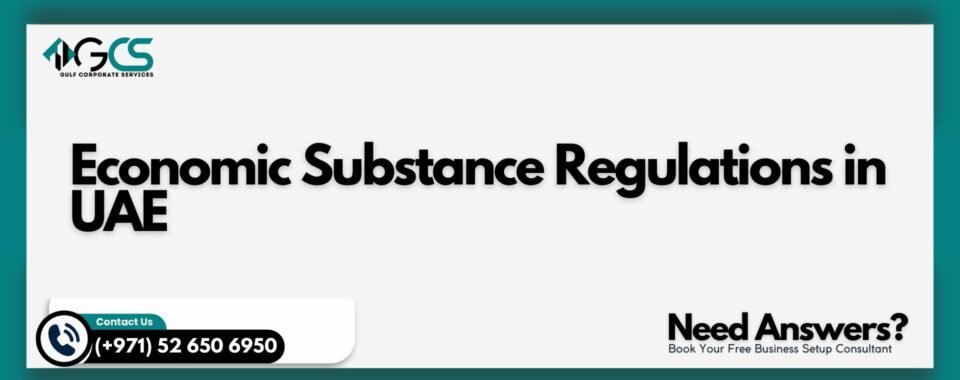
The United Arab Emirates (UAE) has solidified its position as a global business hub, attracting companies with its strategic location, tax-friendly environment, and robust infrastructure. However, to align with international standards and combat tax avoidance, the UAE introduced the Economic Substance Regulations (ESR) in 2019. These regulations ensure that businesses operating in the UAE demonstrate genuine economic activity. This article provides an in-depth guide to Economic Substance Regulations in UAE, covering their purpose, requirements, compliance process, and implications for businesses. Whether you’re a multinational corporation or a local entity, understanding ESR is crucial for maintaining compliance and leveraging the UAE’s business ecosystem.
What are Economic Substance Regulations in UAE?
The Economic Substance Regulations in UAE were introduced to ensure that companies conducting specific activities in the UAE have substantial economic presence and are not merely shell entities for tax avoidance. The regulations align with the OECD’s Base Erosion and Profit Shifting (BEPS) framework and the EU’s tax governance standards. They apply to businesses engaged in “Relevant Activities,” requiring them to demonstrate that their operations generate real economic value in the UAE.
The UAE’s Ministry of Finance oversees ESR, with the Federal Tax Authority (FTA) acting as the regulatory body for compliance and enforcement. Businesses must meet specific substance tests, maintain records, and file annual reports to prove their economic activity. Failure to comply can result in significant penalties, making it essential for companies to understand and adhere to these regulations.
Why Were ESR Introduced in UAE?
The UAE introduced ESR to enhance transparency and combat harmful tax practices. By ensuring that businesses have a genuine economic presence, the regulations strengthen the UAE’s reputation as a credible jurisdiction for global trade. They also help businesses avoid scrutiny from international tax authorities and maintain access to global markets.
Who Needs to Comply with Economic Substance Regulations?
ESR applies to all businesses in the UAE, including those in mainland, free zones, and offshore jurisdictions, that conduct Relevant Activities. These activities are defined under the regulations and include specific business operations that must meet economic substance criteria. Below is a breakdown of who needs to comply:
Businesses Conducting Relevant Activities
The regulations cover nine Relevant Activities that are considered high-risk for tax avoidance. These include:
- Banking
- Insurance
- Investment fund management
- Lease-finance
- Headquarters
- Shipping
- Holding company activities
- Intellectual property holding
- Distribution and service center activities
Businesses engaged in these activities, whether licensed in the UAE mainland, free zones, or offshore, must comply with ESR requirements.
Exemptions from ESR
Certain entities may be exempt from ESR, such as businesses wholly owned by UAE residents that do not engage in international transactions or entities subject to corporate tax in the UAE. However, these entities must still notify the FTA of their exempt status and provide supporting documentation.
Multinational and Local Entities
Both multinational corporations and local businesses conducting Relevant Activities must comply with ESR. For multinationals, this means demonstrating that their UAE operations have adequate substance, while local businesses must ensure their activities align with regulatory requirements.
Understanding the Economic Substance Test
To comply with ESR, businesses must pass the Economic Substance Test, which evaluates whether a company has sufficient economic activity in the UAE. The test consists of three key components:
Directed and Managed in the UAE
Businesses must demonstrate that their board meetings, strategic decisions, and management activities occur in the UAE. This includes holding board meetings with a quorum of directors physically present in the UAE and maintaining records of these meetings.
Core Income-Generating Activities (CIGA)
Each Relevant Activity has specific Core Income-Generating Activities (CIGA) that must be performed in the UAE. For example, a banking business must conduct lending or deposit-taking activities in the UAE, while a distribution center must manage logistics locally. Businesses must prove that these activities are carried out by qualified employees in the UAE.
Adequate Physical Presence, Employees, and Expenditure
Businesses must have an adequate number of full-time employees, physical assets (e.g., offices), and operating expenditure in the UAE proportional to their activities. The definition of “adequate” depends on the scale and nature of the business, but it ensures that the company has a tangible presence in the UAE.
How to Comply with Economic Substance Regulations
Compliance with Economic Substance Regulations in UAE involves a structured process to meet reporting and substance requirements. Below are the key steps:
Step 1: Determine Applicability
Businesses must first identify whether they conduct any of the nine Relevant Activities. This involves reviewing their business operations, licensing agreements, and income sources to confirm ESR applicability.
Step 2: Conduct a Self-Assessment
Perform a self-assessment to evaluate whether your business meets the Economic Substance Test. This includes reviewing management activities, CIGA, and physical presence in the UAE. Documenting this assessment is crucial for compliance.
Step 3: File an ESR Notification
All businesses conducting Relevant Activities must file an annual ESR Notification with the FTA, typically within six months of the financial year-end. The notification confirms whether the business is subject to ESR and provides basic details about its activities.
Step 4: Submit an ESR Report
If the business is subject to ESR, it must file an ESR Report within 12 months of the financial year-end. The report includes detailed information about the company’s activities, income, employees, assets, and expenditure in the UAE. The FTA uses this report to assess compliance with the Economic Substance Test.
Step 5: Maintain Records
Businesses must maintain accurate records of their activities, including board meeting minutes, financial statements, and employee details, for at least six years. These records must be available for FTA audits.
Penalties for Non-Compliance with ESR
Non-compliance with ESR can result in significant consequences, including financial penalties and reputational damage. The penalties include:
- Failure to File Notification: A fine of AED 20,000.
- Failure to File ESR Report: A fine of AED 50,000.
- Providing Inaccurate Information: Penalties up to AED 50,000.
- Failure to Meet Economic Substance Test: Fines starting at AED 50,000 for the first year, escalating to AED 400,000 for subsequent years, along with potential license suspension.
Repeated non-compliance may lead to the exchange of information with foreign tax authorities, impacting a business’s global operations.
Benefits of Complying with ESR
While ESR adds compliance obligations, it also offers several benefits for businesses operating in the UAE:
Enhanced Global Reputation
Compliance with ESR demonstrates that a business operates transparently and adheres to international tax standards. This enhances credibility with global partners, investors, and tax authorities.
Access to UAE’s Business Ecosystem
Meeting ESR requirements ensures businesses can continue operating in the UAE without disruptions, maintaining access to its strategic markets and tax benefits.
Risk Mitigation
Proactive compliance reduces the risk of penalties, audits, or legal action, allowing businesses to focus on growth and innovation.
Challenges of ESR Compliance
Despite its benefits, ESR compliance can pose challenges, particularly for small businesses or those new to the UAE market:
Complex Documentation
Maintaining detailed records of CIGA, board meetings, and financials requires robust systems and expertise, which can be resource-intensive for smaller entities.
Cost Implications
Hiring employees, leasing office spaces, and incurring operational expenditure to meet substance requirements can increase costs, especially for businesses with limited operations in the UAE.
Regulatory Updates
ESR regulations may evolve, requiring businesses to stay updated on changes to avoid unintentional non-compliance.
Tips for Seamless ESR Compliance
To navigate Economic Substance Regulations in UAE effectively, businesses can adopt the following best practices:
- Engage Professional Services: Hire accounting or tax professionals familiar with UAE regulations to manage ESR compliance.
- Implement Robust Systems: Use software to track CIGA, employee data, and expenditure, ensuring accurate reporting.
- Conduct Regular Audits: Perform internal audits to verify compliance with the Economic Substance Test and identify gaps.
- Train Management: Ensure directors and key personnel understand ESR requirements and their role in compliance.
- Monitor Regulatory Changes: Stay informed about updates to ESR through the FTA’s website or professional advisors.
Conclusion
The Economic Substance Regulations in UAE are a critical component of the country’s commitment to global tax transparency and economic integrity. By understanding the scope of ESR, conducting Relevant Activities, and meeting the Economic Substance Test, businesses can ensure compliance while leveraging the UAE’s dynamic business environment. While challenges like documentation and costs exist, proactive measures and expert support can simplify the process. Engaging professional Accounting services in Dubai, UAE can provide businesses with the expertise needed to navigate ESR seamlessly, ensuring long-term success in the UAE market.
FAQs
What are Economic Substance Regulations in UAE?
Economic Substance Regulations (ESR) are rules introduced in the UAE to ensure businesses conducting specific activities have a genuine economic presence, aligning with international tax standards.
Which businesses need to comply with ESR?
Businesses conducting Relevant Activities, such as banking, insurance, or holding company activities, in the UAE mainland, free zones, or offshore jurisdictions must comply with ESR.
What is the Economic Substance Test?
The Economic Substance Test evaluates whether a business is directed and managed in the UAE, conducts Core Income-Generating Activities locally, and has adequate employees, assets, and expenditure.
What are the penalties for ESR non-compliance?
Penalties include fines of AED 20,000 for failing to file notifications, AED 50,000 for failing to file reports, and up to AED 400,000 for repeated failure to meet the Economic Substance Test.
How can businesses ensure ESR compliance?
Businesses can ensure compliance by filing timely notifications and reports, maintaining records, and engaging professional accounting services to navigate the regulations effectively.








